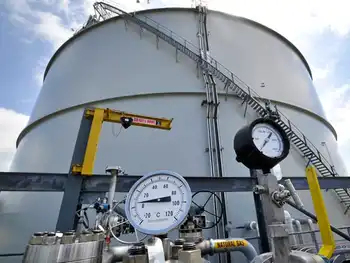Consortium to improve efficiency of CCGT plants
By Industrial Info Resources
Arc Flash Training CSA Z462 - Electrical Safety Essentials
Our customized live online or in‑person group training can be delivered to your staff at your location.

- Live Online
- 6 hours Instructor-led
- Group Training Available
The project will be carried out in association with Institut fur Technische Thermodynamik des Deutschen Zentrums fur Luft und Raumfahrt, Paul Wurth Group SA and ThyssenKrupp Xervon Energy GmBH.
The thermal storage technology is expected to improve the working efficiency of CCGT plants significantly by enabling scheduled decoupling of heat and electricity supply. The technology will enable excess heat generated during the day to be stored and utilized at night, when the gas turbines are not in use.
Many government entities and industrial bodies have expressed interest in the commercial development of this technology.
However, the process may not be feasible for CCGT power facilities that operate on the combined heat and power (CHP) technology. Unlike conventional thermal power plants that are driven by the power market, the CCGT-CHP plants are driven by the heat market and are operational even at nighttime, although the demand for electricity on the grid is low at that time.
The initial economic and technical feasibility studies for the project have been completed. The project will be developed in about 30 months at RWE Energy's cogeneration facility in Dortmund, Germany. Upon completion, a pilot power plant with a capacity of 10 megawatt-hours will be integrated with the thermal storage facility to study its operational and commercial viability.
DLR, one of the partners in this venture, will be responsible for the design, development and testing of the thermal storage facility. Paul Wurth Group, having executed similar projects in the metal and glass industries, will provide technology support. ThyssenKrupp Xervon Energy, which has experience in building CCGT power plants globally, will provide expertise in the integration of the thermal storage facility to power plants.
Europe has been promoting "green energy" and urging countries to focus on developing sustainable clean power technologies. The effort is gaining momentum, with leading energy players announcing new initiatives aimed at reducing carbon dioxide emissions to counter climate and environment changes.
Scottish Power Plc, a part of Iberdrola SA, is among the contenders for a $1.4 billion competition organized by the U.K. government to develop a full-scale carbon capture and storage (CCS) facility. The competition aims at integrating the CCS technology with coal-based power plants, to capture and store carbon dioxide produced during the combustion of fossil fuels.
Scottish Power is also planning to retrofit its Longannet coal-fired power plant with a post-combustion demonstration-scale facility by 2014. The carbon emissions will be captured and stored in porous rocks near the North Sea. The plan also includes utilizing a fuel pipeline to carry carbon dioxide from Central Scotland to Teesside near the North Sea coast. Forth Valley and Humberside have also been identified as potential 'emitting hubs'.
RWE Energy and E.ON Ruhrgas are the two other companies participating in the competition. While RWE Energy is exploring the possibility of integrating CCS at its plant in Tilbury, Essex, E.ON Ruhrgas will fit this technology at its new power generating facility in Kingsnorth, Kent.
Leading energy players have urged the U.K. government to provide support to make the CCS technology commercially and economically viable. Industry representatives attending the Adam Smith Institute's "Future of Utilities" conference in London indicated that it is not possible to assess the impact of the technology unless it is commercially implemented on a large-scale. They stressed the need for financial assistance from the government, as it would be tough and risky for individual companies to undertake huge investments independently.
Global energy players also expressed interest in developing the U.K. as the hub for CCS technology because of the availability of infrastructure for development, natural storage sites and a cooperative government. Industry leaders stressed that the time was right for the U.K. to gain the "first mover" advantage as the global CCS market is estimated to grow to $100 billion by 2030.











